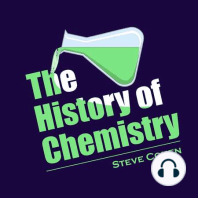20 min listen
70: Go with the Flow
ratings:
Length:
23 minutes
Released:
May 28, 2023
Format:
Podcast episode
Description
We hear about the discovery of liquid crystals by Friedrich Reinitzer in 1888, through Georges Friedel's compendium in 1922 describing main types of liquid crystals. Around that time the first electromagnetic properties of liquid crystals were described by M. Jezewski, and further researched by W. Kast, Vsevolod Frederiks, and A. Repiewa. The first use of these properties was patented by the Levin brothers in 1936. A revival of research into liquid crystals began post-World War II by George Gray and then Glenn Brown by the early 1960s, which is when we reach the invention of two liquid-crystalline polymers, Kevlar and Nomex. My Patreon subscribers can download a supplemental sheet for diagrams of some of these materials.Support the show Support my podcast at https://www.patreon.com/thehistoryofchemistry Tell me how your life relates to chemistry! E-mail me at steve@historyofchem.com Get my book, O Mg! How Chemistry Came to Be, from World Scientific Publishing, https://www.worldscientific.com/worldscibooks/10.1142/12670#t=aboutBook
Released:
May 28, 2023
Format:
Podcast episode
Titles in the series (100)
23: Ionic but not Doric nor Corinthian by The History of Chemistry
